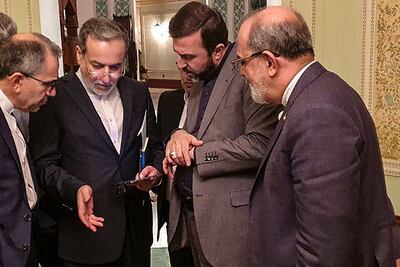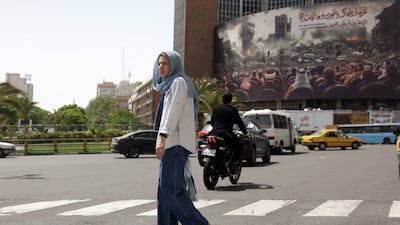The next round of talks between Washington and Tehran set for later this week is expected to set out a framework for negotiations on Iran's nuclear programme, a senior US official said on Wednesday.
US Deputy Assistant Secretary for Iraq and Iran Victoria Taylor described the first round of talks between the two countries in Oman on Saturday as “positive” and “constructive”, during a panel at the Sulaimani Forum in Iraq.
“This first round was positive, it was constructive, and there’s agreement there will be talks in the coming days,” Ms Taylor said of Saturday’s initial discussions that were led by US special envoy to the Middle East Steve Witkoff and Iranian Foreign Minister Abbas Araghchi.
“We’re still in early stages and have not defined the parameters,” she said, noting that “the coming discussions will help us chart this path forward.”
Deputy Iranian Foreign Minister Saeed Khatibzadeh was in the hall during the discussions.
A second round of discussions will take place again on Saturday, the two negotiating officials said after the talks. “This is a very positive first step but of course there is a long way to go,” Ms Taylor said.
Iran on Wednesday confirmed that the second round would be held in Rome, after initially denying reports that they would be hosted in the Italian capital.
Discussions between the geopolitical foes have been taking place against the backdrop of US President Donald Trump’s renewed policy of “maximum pressure” on Iran, while Tehran is seeking much-needed sanctions relief.

“I think it's also important to note that maximum pressure is still in effect, even as we are pursuing negotiations with Iran over the nuclear programme,” Ms Taylor stated, adding that Mr Trump is set on preventing Iran access to revenue that allows it to “fund its nuclear programme and terrorism.”
Iran says its nuclear programme is purely for peaceful purposes, but the UN's nuclear watchdog has raised alarm over its uranium enrichment levels, warning they are close to weapons-grade. Ms Taylor emphasised that, in addition to Iran’s nuclear programme, the US maintains its concerns regarding Tehran’s support of its regional proxy militia groups.
“The best way for Iran to get that economic relief and seek the removal of those sanctions is for it to stop the activities that caused us to put those sanctions into place,” she said, referring to Iranian backing of these groups.
The US has been carrying out frequent strikes aimed at the Iran-backed Houthi rebels in Yemen in recent weeks while Israel has engaged in warfare against other Tehran allies – Hamas and Hezbollah – in Gaza and Lebanon. “Iran's continued support to proxy militias – that's a concern not only to the United States, but we know for countries throughout the region,” Ms Taylor added.


